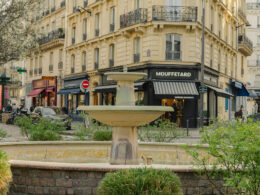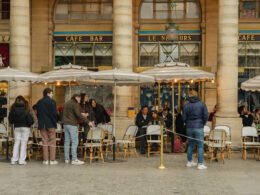Looking for travel tips for visiting Paris? Look no further with our insider guide written by someone who actually lives in the city!
Our advice will help you plan your trip and ensure that you get the most from your time in the city of light. So read on and discover what to do and what not to do during your time in Paris!
This article is divided into several sections:

What to Know Before Visiting Paris for the First Time
If you’re planning your first trip to Paris and want to know what to expect then read this section. The city itself is very different to other European capitals and doing research before you go is key to having a good time.
Prepare to Walk
Paris really isn’t that big (you can cross the city on foot in under 1.5 hours) and the best way to see the city is to walk. The public transport system is fantastic and it can help you jump quickly (< 30 minutes) from one side of the city to the other. However by jumping on the metro you’ll miss out on the beautiful streets of Paris and for me, that’s something you can’t miss!
You can expect to walk around 2-3 hours per day covering around 9 miles (12km) exploring 3-4 arrondissements. I’d advise that you pack comfy, broken-in shoes to help you rack up the miles! Apart from Montmartre and the Belleville neighbourhood, Paris is very flat.
Book Museums & Sights Ahead of Time
You’ll no doubt be planning on seeing some of the incredible big attractions and museums during your trip and I’d definitely recommend booking them in advance. Planning a trip to Paris is important and building in trips to the Louvre and Eiffel Tower is a must.
One part that so many tourists forget is the time it takes to queue for tickets before even entering the museum/monument. Many museums are also closed at least 1 day per week so planning is essential and buying advanced tickets will save you lots of time.
Tip: I recommend getting a Paris Museum Pass which gives you entry to over 60 museums, art galleries and attractions over 2-6 days. This includes Le Louvre, the Arch de Triomphe and the Musée d’Orsay.
It Always Takes Longer Than You Think
A really important bit of advice for when planning city trips is to remember that getting around a city always takes time. If you’re on a tight schedule on a short trip then I would always advise that you build in contingencies for delays, queues and traffic.
For example, planning on going from Louvre and going to the Champs Elysées or a lunch spot? Take into account time to:
- Navigate your way back to the central entrance
- Find your locker
- Navigate your way to the exit (trust me, this takes time)
- Find your way to the nearest Metro (a good 10 minute walk from the locker room) or taxi
This could take you at least 20 minutes from when you plan to leave to when you could actually be on your way. Be realistic when planning your itinerary!
I’d also recommend not booking your favourite restaurant on your first night unless you arrive in the morning. Delayed flights & traffic can lead to disappointment and many of the top spots are reserved for days if not weeks in advance.
What to Wear Visiting Paris
This really depends on many factors. What season you’re visiting in and of course what you plan on doing. If you’re committed to sight-seeing and walking then I’d recommend plenty of thin layers. Museums and art galleries can get really warm so you’ll want to be able to carry around light layers to adjust as needed. The majority of the big museums & galleries have free lockers for you to put away bags and coats.
Do note that the vast majority of Parisians don’t dress up on weekends or for casual dinners out like in the UK/US!
General Advice From a Local
This section contains some helpful tidbits of information from my experience after living in France for over 7 years.

Always Say “Bonjour!” When You Enter a Store or Restaurant
This is key part of politeness when entering any store or restaurant in France. Be it in a boulangerie or small boutique, you will always be greeted with either ‘bonjour’ (in the day) or ‘bonsoir’ (in the evening). It’s really important to reciprocate the greeting otherwise it’ll appear very disrespectful. I’ve once seen a shopkeeper refuse to serve a customer because of this!
Book Restaurants Ahead of Time
The best restaurants, like in any big city, can be booked up weeks in advance. If you’re a foodie and have an idea of what restaurants you want to check-out then you need to plan. Many of the best restaurants don’t open on weekends (Septime included) and need to be reserved 3 weeks+ in advance.
The majority of good restaurants are open for lunch and dinner but won’t serve food in-between these services. If a restaurant doesn’t take reservations then you’ll need to arrive early to avoid disappointment. Many of these allow you to put your name down on a list which will allow you to go get a glass of wine before hand.
If you want to find out more about Parisian restaurant etiquette (including tipping) then check out our guide below:
Guide to Paris Restaurant Etiquette & Tipping
Take Public Transport
Public transport in Paris is really good and on the whole, is very safe. It’s quick and relatively inexpensive. During recent years Paris has introduced more cycling lanes and restricted inner city roadways meaning a taxi can take you longer than taking a metro ride.
Paris’ inner-city train system is split into the metro (Lines 1 to 14) and the RER. The metro (subway/tube) is inner-city and with recent line extensions does go out to the suburbs. The RER are much bigger railways that cross the city into the suburbs. Taking a plane? The RER B connects both Charles de Gaulle and Orly airport to the centre. There’s also a fantastic bus system that
If you’re planning on mainly walking during your stay then you can still buy single tickets for €2.20. This is usually cheaper than most passes. Planning on using the public transport more than 7 times per day? Get a Paris Viste pass which allow you unlimited travel in central Paris with options ranging from 1-5 days. This pass for 1 adult costs €33.90 for 3 days. This makes sense if you’re really travelling around Paris!

FAQs on Visiting Paris
In this section I answer frequently answered questions that many visitors have before travelling to Paris!
What Taxis Should You Take in Paris?
There are two big taxi companies in Paris and operate officially that you can use:
G7: 01 41 27 66 99
Alpha Taxis: 01 45 85 85 85
These taxis operate in Paris and you’ll find them in taxi ranks in the city centre, airports and train stations. They operate on fixed rates per km and time.
Tip: Travelling from the airport to the centre? ONLY use the official taxi rank and never accept rides from drivers who approach you. There are flat fees for rides from both CDG and Orly airport. These range from €32-58 depending on the airport and side of the city that you’re travelling to.
Uber exists in Paris but I’ve found that there are less and less drivers on the app in recent years and there’s no guarantee of a quick pick-up.
Is It Safe to Visit?
Yes Paris is a safe city to visit. There is a low rate of violent crime in the city centre but pickpocketing is common – especially on the city’s metro system.
Read more and discover tips on how to stay safe in the city in our in-depth guide below:
Is Paris Safe?
Do You Need to Speak French?
No you don’t need to speak French to come to Paris. The majority of Parisians speak French and especially those who work in restaurants and attractions in touristy areas.
However, speaking a little bit of French is appreciated especially the basics such as saying ‘Bonjour’ and ‘Merci.
You may find it difficult to have a conversation if you’re trying your high-school/college French as Parisians speak very quickly and differently compared to what you may have learned!
Is Paris Friendly to Tourists?
Paris has a reputation for not being the most friendly city in the world and I’d probably agree. Paris is a busy, densely populated city which doesn’t make for the most relaxing living environment for the locals. Parisians are generally pretty grumpy and haven’t got time for those who don’t make an effort with the French culture.
The hospitality culture is very different to the UK & USA and the idea that ‘the customer is always right’ does not apply in France! (That is of course if you’re not staying in a 5* hotel!). It’s also worth noting that Parisians tend to exist in their own bubble – they’re in general not particularly interested in others around them. Finally, it’s important to respect the culture and the norms in Paris:
- Do not be rude with servers or their managers
- Queue in the restaurant? Do not try your luck to get pushed up the wait list
- Do not play loud music/videos from your phone in public transport (you can be fined for this) or in restaurants
- Respect other peoples’ personal space in restaurants and in public
However, if you’re polite and respectful you’ll find that Parisians are actually much nicer than they’re given credit for!














